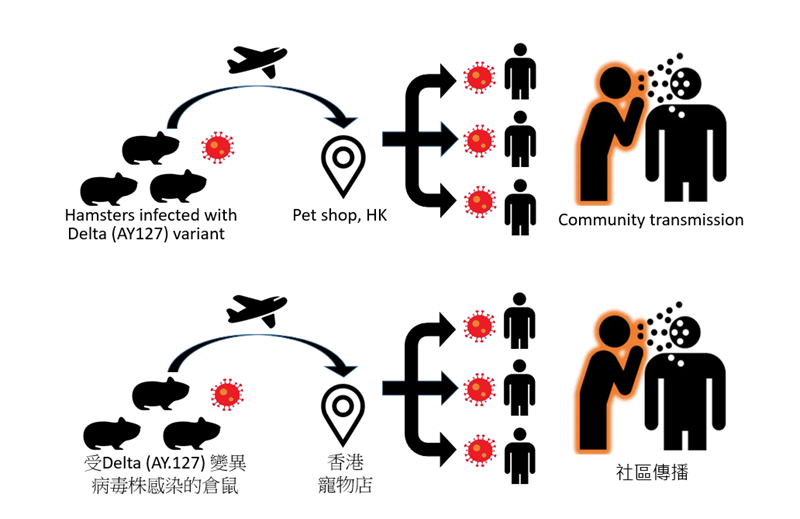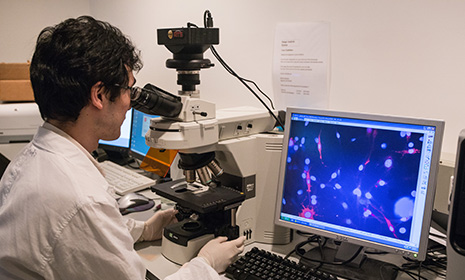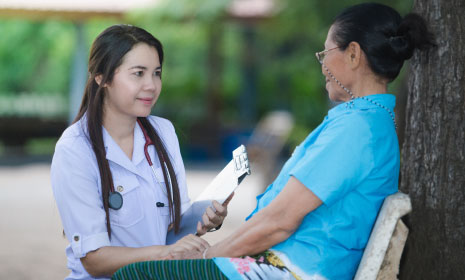HKUMed finds pet Syrian hamsters can naturally acquire SARS-CoV-2 and cause human infection
A joint investigation by the School of Public Health, LKS Faculty of Medicine of The University of Hong Kong (HKUMed) and Agriculture, Fisheries and Conservation Department, Government of the Hong Kong Special Administrative Region shows that imported pet Syrian hamsters that naturally acquired SARS-CoV-2 infection were the source of a local outbreak. Infected Syrian hamsters can transmit the virus to humans, leading to sustainable SARS-CoV-2 virus transmission among humans. This work highlights that hamsters can be an additional reservoir of SARS-CoV-2. The findings are now published in The Lancet [link to the publication].
Background
SARS-CoV-2 has been demonstrated to have a wide host range besides humans. Transmission of SARS-CoV-2 from humans to other mammals, including pet animals, has been previously documented. However, with the exception of farmed mink, there is no previous evidence that these infected animals can infect humans, resulting in sustained human-to-human transmission. A research led by Professor Leo Poon Lit-man, Professor and Head of Division of Public Health Laboratory Sciences; Professor Malik Peiris, Tam Wah-Ching Professor in Medical Science and Chair Professor of Virology; and Dr Yen Hui-ling, Associate Professor, School of Public Health, HKUMed, has revealed that pet Syrian hamsters can be naturally infected by SARS-CoV-2 and that the SARS-CoV-2 found in pet Syrian hamsters can cause human infection.
Research findings and significance
The findings showed that there was an introduction of SARS-CoV-2 delta variant (AY.127) to Hong Kong’s local community via imported pet Syrian hamsters in January 2022. Over 50% of studied pet Syrian hamsters from the pet shop and warehouse sampled had evidence of SARS-CoV-2 infection. Full viral genome sequencing analysis on samples from these infected hamsters revealed that this delta variant was introduced to the affected hamster population about three months before this incident. Such introduction of SARS-CoV-2-infected hamsters to Hong Kong resulted in more than one hamster-to-human transmission event. Some of these infected patients subsequently spread the disease to other individuals, leading to onward human-to-human transmission of delta variant in the local community.
‘This is a public health concern. Pet Syrian hamsters can be a secondary reservoir of SARS-CoV-2. If we allow SARS-CoV-2 to circulate in hamsters for a long period, the virus might acquire additional mutations and change its biological features, such as ability to transmit, cause disease and evade vaccine protection. Thus, there is a possibility that human beings might acquire a novel SARS-CoV-2 variant coming from pet Syrian hamsters. This might have impacts on our existing COVID-19 control measures,’ said Professor Leo Poon.
‘Because Hong Kong had very few COVID-19 cases at the time, it was possible to trace the source of virus in this incident. Similar events might occur in other places, without being recognised. Our findings highlight that infected hamsters may play a role in movement of viruses across national borders,’ remarked Professor Peiris.
‘This is the first report showing that pet Syrian hamsters can be naturally infected by SARS-CoV-2, and lead to human infection. There might be other animal species that can cause similar problems. This emphasises the need for using a “One Health” approach to control COVID-19 and other emerging viral diseases. There is a need of systematic surveillance of SARS-CoV-2 in both wild and domesticated animals,’ said Dr Yen.
About the research team
The study was led by Professor Leo Poon Lit-man, Professor and Head of Division of Public Health Laboratory Sciences; Professor Malik Peiris, Tam Wah-Ching Professor in Medical Science and Chair Professor of Virology; and Dr Yen Hui-ling, Associate Professor, School of Public Health, HKUMed. Other research team members includes Dr Thomas Sit Hon-chung, Dr Christopher J Brackman, Dr Shirley Chuk Sheung-ying, Dr Karina Tam Wing-si and Dr Pierra Law Ying-tung, Agriculture, Fisheries and Conservation Department; and Professor Gabriel M Leung, Dean of Medicine, The University of Hong Kong; Helen and Francis Zimmern Professor in Population Health, Interim Director of School of Public Health and School of Clinical Medicine, Chair Professor of Public Health Medicine; Dr Gu Haogao, Dr Su Wen, Mr Samuel Cheng Mo-sheung, Ms Lydia Chang Dai-jia, Ms Pavithra Krishnan, Ms Daisy Ng Yuet-mei, Ms Gigi Liu Ying-zhi, Ms Mani Hui Man-yin, Ms Ho Sin-ying, Ms Sia Sin-fun, Mr Choy Ka-tim, Ms Sammi Cheuk Sum-yee, Ms Sylvia Lau Pui-ngan, Ms Amy Tang Wing-yan, Mr Joe Koo Cheuk-tsun and Ms Louise Yung, School of Public Health, HKUMed.
Acknowledgements
This work is supported by the National Institutes of Health of the United States (U01AI151810 and 75N93021C00016), Theme-based Research Schemes of the Hong Kong Research Grants Council (T11-712/19-N and T11-705/21-N), InnoHK grants for the Centre for Immunology & Infection (C2i) and the Laboratory of Data Discovery for Health (D24H), and the Health and Medical Research Fund (COVID190205), Food and Health Bureau, the Government of the Hong Kong Special Administrative Region. We thank Dr Les Sims for his valuable advice. We thank Dr Les Sims for his valuable advice.
About the School of Public Health, HKUMed
The School of Public Health, LKS Faculty of Medicine of The University of Hong Kong has a long and distinguished history in public health education and high impact research. With world leading research in infectious diseases as well as on non-communicable diseases of both local and global importance, the School has made significant contributions through its research and advocacy to improve the health of populations and individuals, both locally and globally. The School is a leading research and teaching hub in public health on influenza and other emerging viruses, control of non-communicable and infectious diseases, tobacco control, air pollution, psycho-oncology, behavioural sciences, exercise science, life-course epidemiology, population mental health, and health economics, health services planning and management. This work has informed international, national and local public health policies.









.png)
